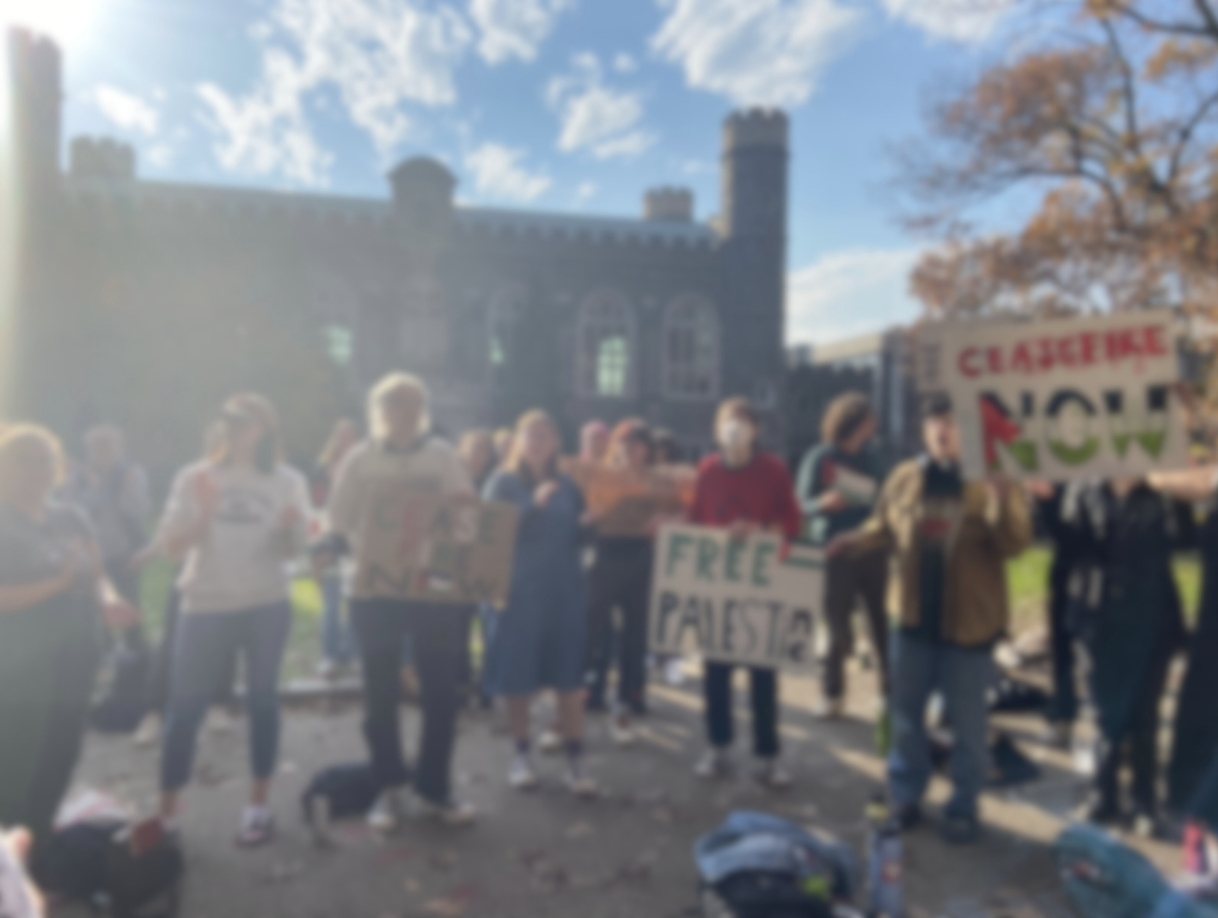By William Harris, Guest Writer
Across the country, students who attempt to express their opinions about the Israel-Palestine conflict are finding themselves punished for their speech, protests and free association. Examples of stifled expression abound: Brandeis University banned its campus chapter of Students for Justice in Palestine, while NYU students tore down publicly-posted fliers depicting missing Israeli hostages. As the Israel-Hamas war continues, we have an opportunity to buck the national trend and ensure that viewpoint discrimination, censorship and the heckler’s veto have no place at Haverford or Bryn Mawr.
Many students and faculty are making good-faith efforts to engage in dialogue across differences and ensure everyone has an opportunity to learn more about the Israel-Palestine conflict and its associated history. At Haverford, Ally Landau hosted a student teach-in, while Barak Mendelsohn hosted a faculty teach-in days after the October 7th terrorist attacks. According to an email from John McKnight, the Dean of Haverford College, there will be more teach-ins and opportunities for discussion in the weeks ahead that will ensure a variety of perspectives are represented.
Despite the best efforts of some students and faculty to accommodate and engage with speech from all perspectives, student activism within the Bi-Co has been threatened with punishment from the administration. At Bryn Mawr, the Bi-Co Chapter of Students for Justice in Palestine hosted a sit-in outside President Kim Cassidy’s office a few weeks ago. In response to the students’ chants and posters (which were removed by the administration), Karlene Burrell-McRae, Dean of the Undergraduate College at Bryn Mawr, threatened an Honor Trial. According to The Bi-College News’ reporting, Burrell-McRae told the protesters,“You can sit here, but you might be sent to Honor Trial if you hang posters [including the phrase, ‘From the River to the Sea, Palestine Will Be Free.’]”

In this situation, with McCrae posturing herself as the Honor Council’s inquisitor-general, student protesters faced the threat of punishment for expression that would be protected by the First Amendment on a public school campus. While the speech in question was undoubtedly controversial, since the American Jewish Congress considers the “from the river to the sea” slogan to be anti-semetic, it does not cross the boundaries of what the First Amendment allows. In fact, the purpose of the First Amendment is to protect controversial speech. Furthermore, Nadine Strossen, the former president of the ACLU, has argued that the best way to respond to hate is with free speech, not censorship. If student protesters do end up being punished, as the Deans have promised, then Bryn Mawr’s stated commitments to free speech and academic freedom would effectively mean nothing.
According to the Bryn Mawr College Self-Government Association Constitution, Honor Trials are based on principles of self-governance, and neither the Deans nor the College as an entity can bring a case to trial since they are not eligible to serve as a confronting party. Given Haverford and Bryn Mawr’s emphasis on student agency and self-direction, it is a disturbing incursion on student autonomy for an administrator to claim to speak on behalf of the Honor Council when they have no mandate to do so. Bi-Co community members should reject this paternalistic, heavy-handed attempt to hijack student governing processes to silence student protesters.
There are boundaries, of course, to what the First Amendment protects. The First Amendment does not protect true threats and intimidation, incitement to violence, discriminatory harassment, or the heckler’s veto. When speech does not cross those boundaries, however, the First Amendment ensures wide latitude for protesters of all convictions to express their viewpoints, even if that expression is considered by some to be deeply unpopular, offensive, distasteful, or even hateful.
At Haverford and Bryn Mawr, both private schools, administrators and other authorities like the Honor Council are not bound by the First Amendment. However, years of American legal jurisprudence have shaped First Amendment law into a valuable guide for balancing freedom of expression and public safety. It would be an injustice if Haverford and Bryn Mawr students were allowed less expressive autonomy than peers at American public schools who enjoy First Amendment guarantees of political freedom.
Haverford and Bryn Mawr’s student bodies are filled with conscientious individuals who care deeply about current events in Israel and Gaza. All of us should be able to speak freely on an issue of such great personal, academic and political importance. If the Honor Code as it stands today means that students are not allowed to engage in controversial political speech, then it is in serious need of revision, especially in light of advertised school policies which promise expressive rights commensurate with the First Amendment.
Haverford’s Expressive Freedom and Responsibility Policy promises “the right of all students to engage in discussion, to exchange thought and opinion and to speak or write freely on any subject.” There is no Israel-Palestine exception. There is no Honor Council veto.
As a student at a school which prides itself on fostering a community rooted in trust, concern and respect, I believe we should practice those values by allowing our classmates to share their genuinely-held beliefs and supporting their right to engage in political protest, especially when we disagree with them. When we hear something we believe is wrong-headed or hateful, we can engage in counterspeech or counterprotest. What we need is more speech, not less.

